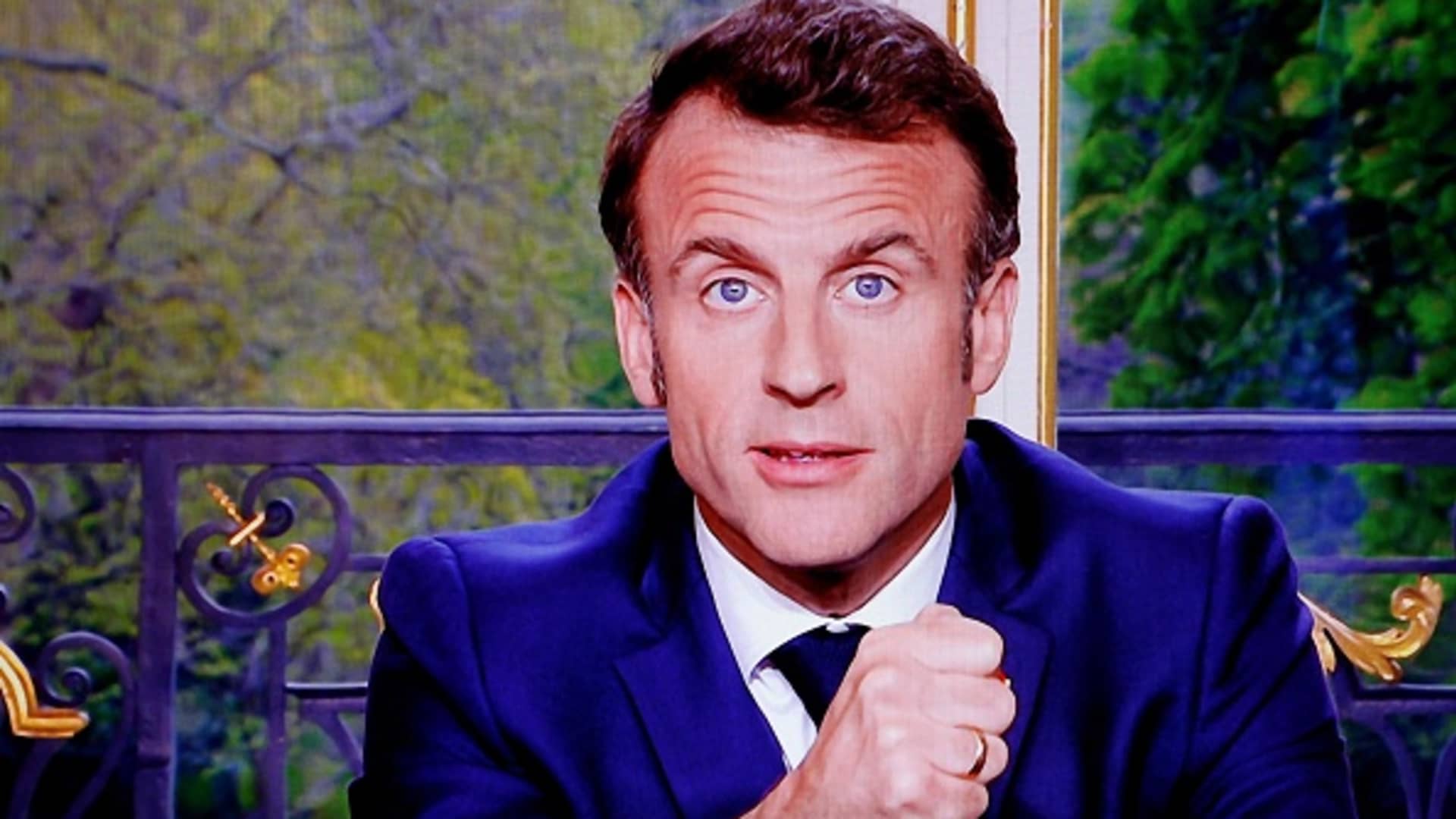Macron doubles down on possible NATO deployment in Ukraine ahead of talks to bridge rift with Germany

A photo of a television screen shows French President Emmanuel Macron during a televised address to the nation, made from the Elysee Palace, after signing into law a pensions reform, in Paris, on April 17, 2023.
Ludovic Marin | AFP | Getty Images
French President Emmanuel Macron has doubled down on the possibility of sending troops into Ukraine, a day before a key summit with Germany, which is staunchly opposed to the idea.
“We cannot exclude options,” Macron said in a joint interview with TF1 and France 2 TV on Thursday, when asked to revisit controversial comments made in late February. At the time, the French leader refused to rule out the prospective deployment of Western troops into Ukrainian territory — resulting in scorn from Russia and a backlash from Macron’s NATO allies.
“What we are doing is giving ourselves red lines,” the French premier continued on Thursday, in comments translated by CNBC, noting that the international community has placed “too many limits in our vocabulary” regarding the war.
“If we decide today to be weak, if, in the face of someone who has no limits, who has crossed all the limits we have given him, if we naively tell him: ‘I will not go farther than this or that.’ In that moment we don’t decide peace, we decide defeat.”
The French leader declined to specify how he envisages a potential troop deployment into Ukraine, stressing instead that “the security of Europe and the security of the French people is at stake here.”
In response to the comments, Kremlin Spokesperson Dmitry Peskov said, “France is already involved in the conflict in Ukraine and is not averse to increasing its involvement,” according to Google-translated remarks reported by Russian state news agency Tass.
The latest statements by Macron once again risk pitting him against NATO allies, who distanced themselves from the possibility of their own national military deployment in Ukraine in February.
The alliance members face separate pressure to increase their defense spending to a previously agreed target of 2% of their national GDP, with two-thirds of members set to meet this objective this year, according to the latest projections.
“We have the capacity to give Ukraine what it needs. Now we need to show the political will to do so,” NATO Secretary-General Jens Stoltenberg stressed during a press briefing.
NATO member contributions have so far been used to supply ammunition and military equipment and maintenance to Ukraine, rather than sending troops into Ukrainian territory — a move that would position the alliance closer to war with Russia. Foreign volunteers have assisted both Russia and Ukraine in the war so far, but not as part of any formal military deployment.
Macron on Friday is meeting with German Chancellor Olaf Scholz in Berlin for talks that many hope could silence simmering tensions over Ukraine. Polish Prime Minister Donald Tusk will also join them, in a rare meeting of the Weimar Triangle — a regional coalition between the three countries, born in 1991.
Berlin has fought to shrug off its image as a slow responder to the conflict in Ukraine, after stalling approval to send Kyiv its Leopard-2 tanks. It now faces similar calls to deliver its Taurus missiles, which Scholz says would require the involvement of German soldiers to operate.
In February, Scholz joined the chorus of NATO leaders starkly opposing Macron’s position of potentially sending troops into Ukraine, insisting on social media: “It is clear: there will be no ground troops from European countries or NATO. That applies.”
Tusk, whose country has staunchly backed Ukraine in the war, comes fresh from a White House engagement earlier this week, during which he, Polish President Andrezj Duda and U.S. President Joe Biden committed “continued support of Ukraine’s self-defense against Russia’s war of aggression,” according to a readout.
“True solidarity with Ukraine? Less words, more ammunition,” Tusk said on social media on Friday.









